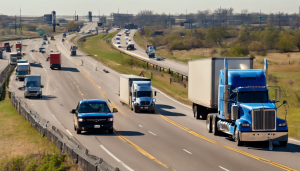Weather is an unpredictable factor that can cause devastating accidents on the road. It’s especially dangerous for Texas trucking, where large commercial vehicles travel long distances on highways and interstates. These massive machines, often weighing 80,000 pounds or more, can become uncontrollable in bad weather conditions. In fact, it’s not uncommon for weather-related accidents to involve multiple vehicles and result in catastrophic injuries or even fatalities.
In this article, we’ll take a deep dive into the unpredictability of weather-related accidents in Texas trucking, discuss the various types of severe weather that can impact truck drivers, and explore the role of trucking companies and drivers in preventing these accidents. Additionally, we’ll provide some essential tips for avoiding weather-related accidents and staying safe on the road.
The Unpredictability of Weather-Related Accidents
Weather is a major factor in many motor vehicle accidents, especially in a state as large and diverse as Texas. The Lone Star State’s weather can change rapidly, and truck drivers must be prepared to handle anything from heavy rainstorms to ice-covered roads. Unfortunately, even the most experienced drivers can find themselves in dangerous situations due to sudden and unexpected changes in weather conditions.
One reason for the unpredictability of weather-related accidents is the sheer variety of weather phenomena that can impact Texas roads. Let’s take a closer look at some of the most common types of severe weather that contribute to trucking accidents in Texas.
Heavy Rain and Flooding
Torrential downpours can create hazardous driving conditions for truck drivers, causing slick road surfaces and reduced visibility. Moreover, heavy rain can lead to flash flooding, which can quickly turn seemingly safe roads into dangerous, fast-moving rivers. According to the National Weather Service, flash flooding is the leading cause of weather-related deaths in the United States. Truck drivers must be especially cautious when driving through flood-prone areas, as the weight and size of their vehicles can make them more susceptible to being swept away by floodwaters.
Fog and Low Visibility
Fog can be particularly dangerous for truck drivers because it can drastically reduce visibility, making it difficult for them to see other vehicles on the road. In some cases, dense fog can lead to chain-reaction accidents, as multiple vehicles collide with one another due to drivers being unable to see what’s ahead of them.
High Winds
High winds can pose a significant risk for truck drivers, especially those operating large, high-profile vehicles like tractor-trailers. Strong gusts can cause trucks to sway or tip over, leading to catastrophic accidents. Moreover, high winds can also result in flying debris, which can damage trucks or cause drivers to swerve suddenly, potentially leading to a collision.
Extreme Heat
Texas is well-known for its scorching summer temperatures, and extreme heat can take a toll on both truck drivers and their vehicles. Overheating can lead to engine failure or tire blowouts, while prolonged exposure to high temperatures can cause drivers to become fatigued or suffer heat-related illnesses, impairing their ability to focus on the road.
Ice and Snow
Although Texas is not typically associated with wintry weather, ice and snow can occasionally impact the state’s roadways. Slippery, icy roads can make it difficult for trucks to maintain traction, potentially leading to skidding or jackknifing accidents. Furthermore, snow can reduce visibility and obscure road markings, making it challenging for drivers to navigate safely.
The Role of Trucking Companies and Drivers in Preventing Weather-Related Accidents
Trucking companies and their drivers play a crucial role in preventing weather-related accidents. Trucking companies must ensure that their vehicles are well-maintained and properly equipped to handle adverse weather conditions. For example, trucks should be fitted with good-quality tires, functioning windshield wipers, and working headlights and taillights.
Additionally, trucking companies should provide their drivers with comprehensive safety training, teaching them how to respond to various weather scenarios and reinforcing the importance of adjusting their driving behavior to suit the conditions. Drivers should be encouraged to slow down, increase their following distance, and use their headlights when visibility is reduced due to weather.
Truck drivers themselves must also remain vigilant and stay informed about the weather conditions they may encounter on their routes. If a driver feels that it is unsafe to continue driving due to severe weather, they should pull over and wait for the conditions to improve before resuming their journey.
Moreover, drivers should be well-rested and alert when they hit the road, as fatigue can impair their ability to react quickly to changing conditions. Truck drivers are required by law to adhere to strict hours-of-service regulations, which dictate how long they can drive without taking a break. However, it’s crucial for drivers to recognize the signs of fatigue and take breaks as needed, regardless of whether they’ve reached their legal driving limit.
If you or a loved one has been involved in a weather-related truck accident, it’s essential to seek legal advice from a truck accident lawyer in Houston who can help you navigate the complex legal process and fight for the compensation you deserve. Don’t hesitate to contact Adley Law Firm at (713) 999-8669 for a free consultation.
Tips for Avoiding Weather-Related Accidents
Here are some essential tips for truck drivers to help avoid weather-related accidents and stay safe on the road:
- Stay informed about the weather conditions on your route and adjust your driving behavior accordingly.
- Slow down and increase your following distance in adverse conditions.
- Use your headlights when visibility is reduced, even during daylight hours.
- Keep your vehicle well-maintained and properly equipped for various weather scenarios.
- Be prepared for sudden changes in weather conditions and have a plan in place for how to respond.
- Take breaks as needed and ensure you are well-rested before hitting the road.
- Be especially cautious in flood-prone areas and never attempt to drive through flooded roads.
- If you encounter severe weather that makes it unsafe to continue driving, pull over and wait for the conditions to improve.
Conclusion
Weather-related accidents are an unpredictable and dangerous aspect of Texas trucking, but with proper preparation and vigilance, truck drivers and trucking companies can reduce the risk of accidents and keep the roads safer for everyone. By staying informed about the weather, maintaining their vehicles, and adjusting their driving behavior to suit the conditions, truck drivers can navigate the challenges posed by severe weather and avoid becoming involved in catastrophic accidents.












